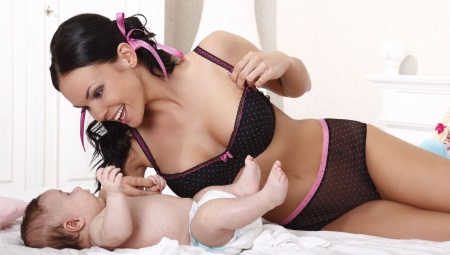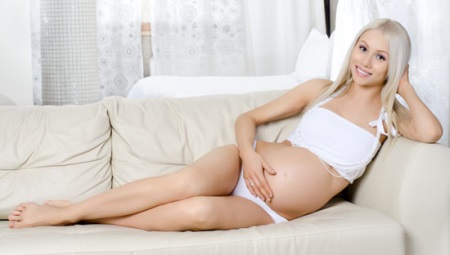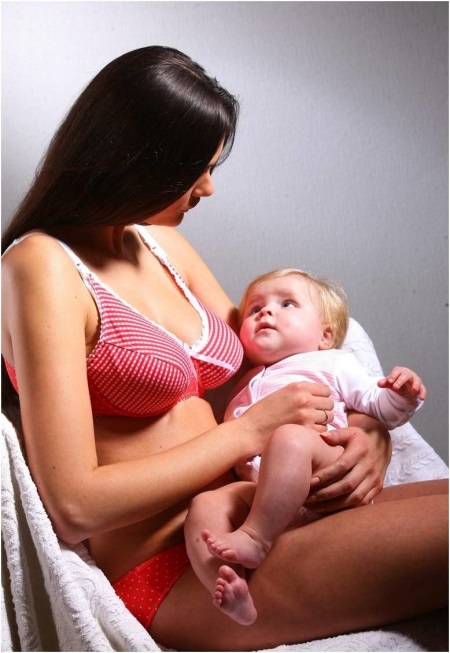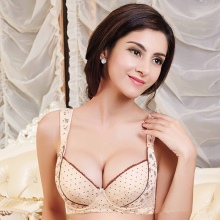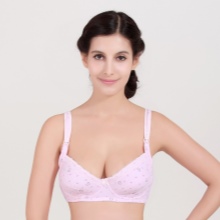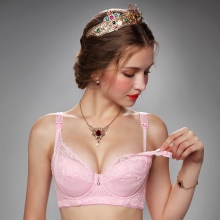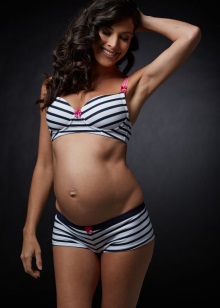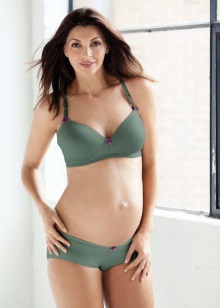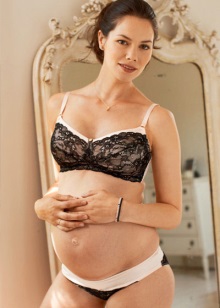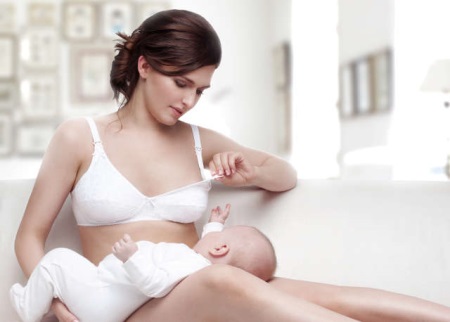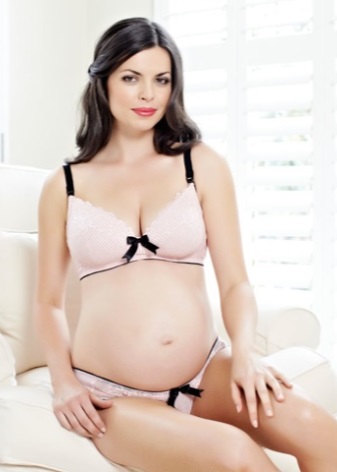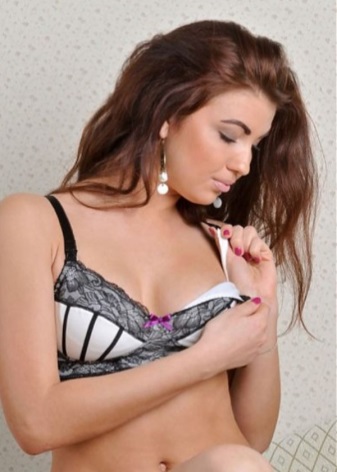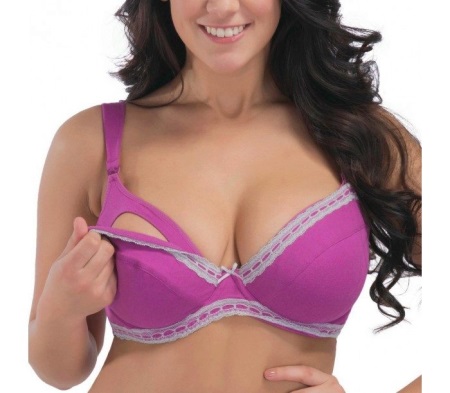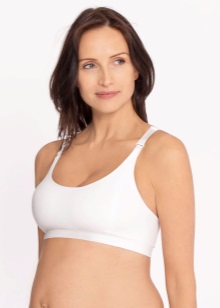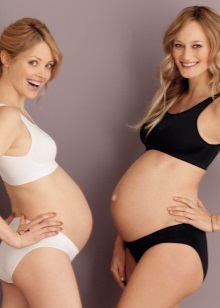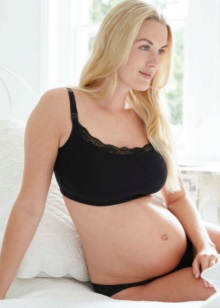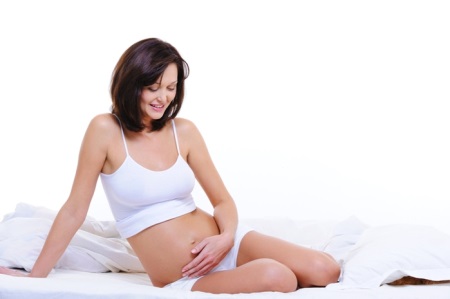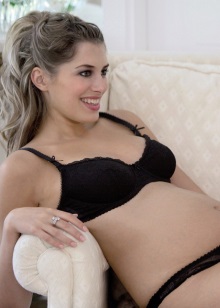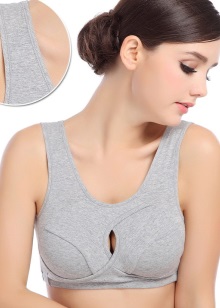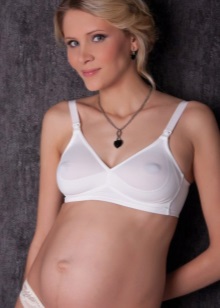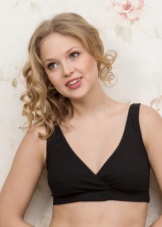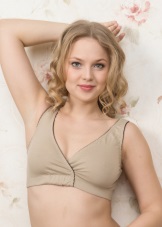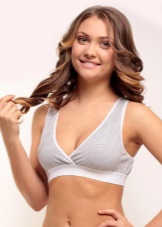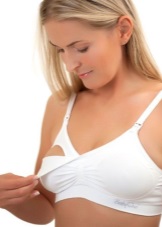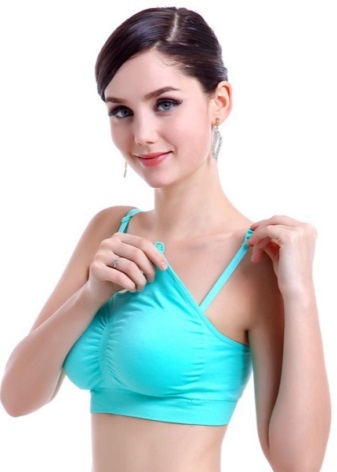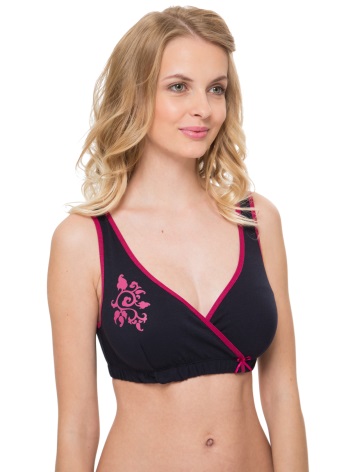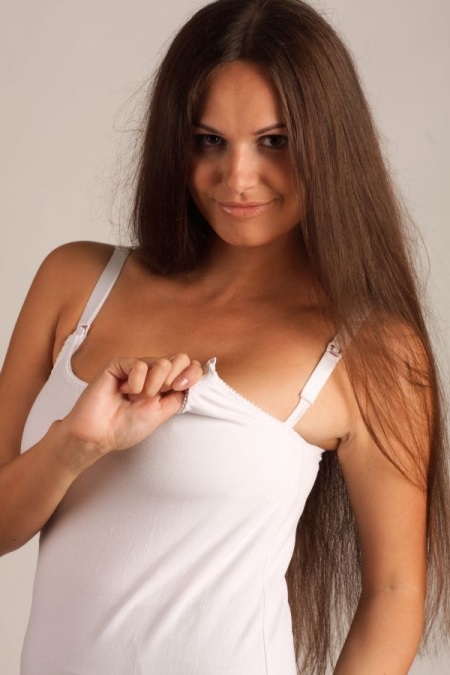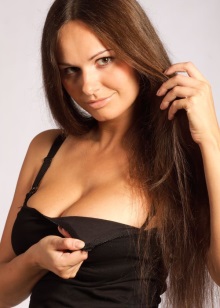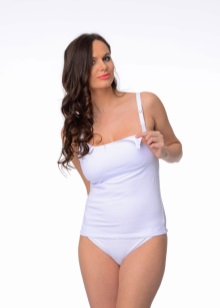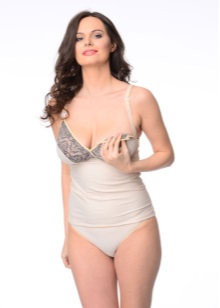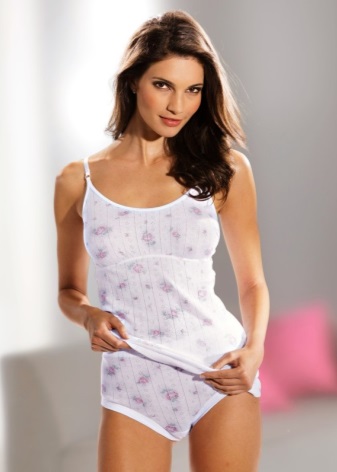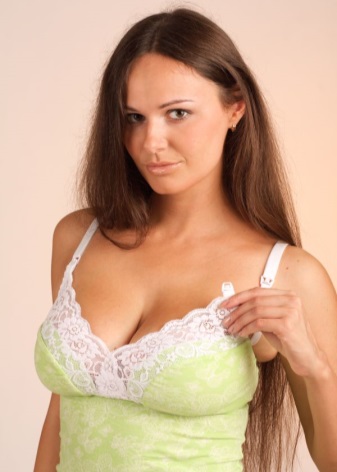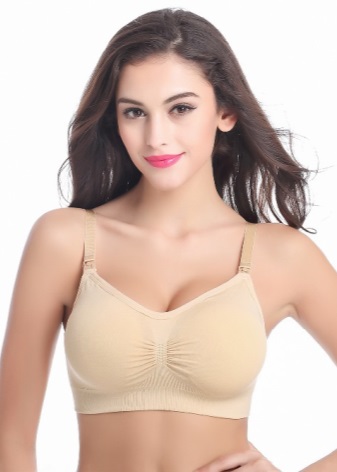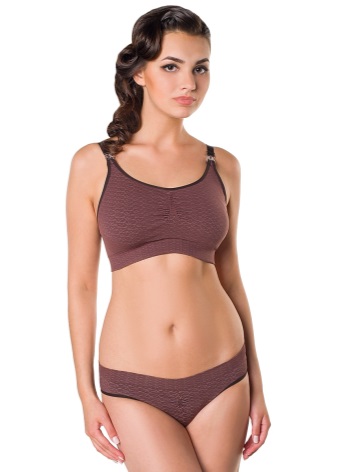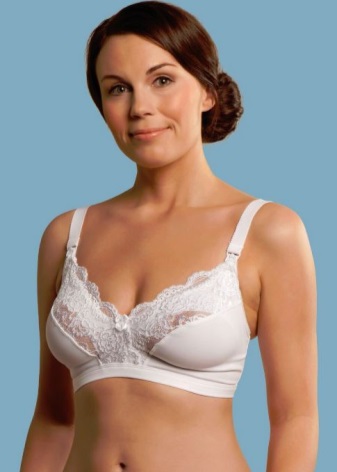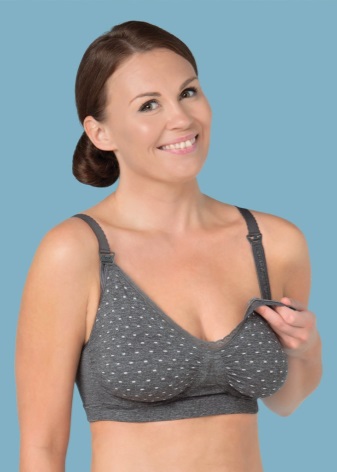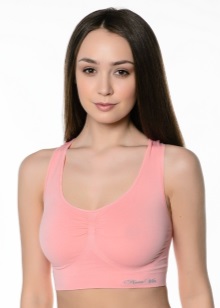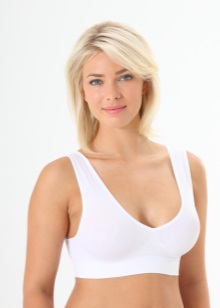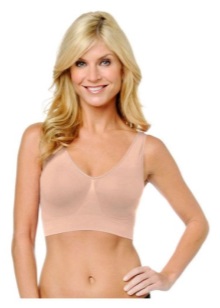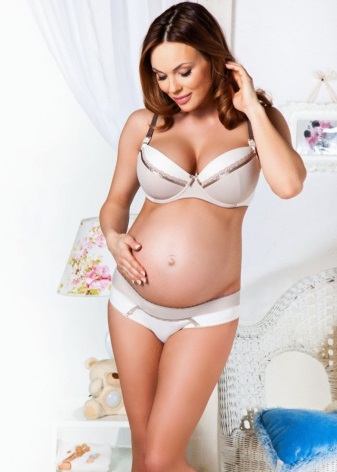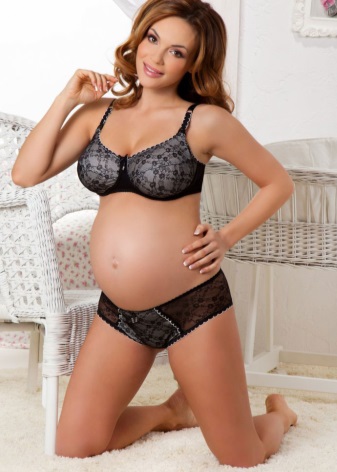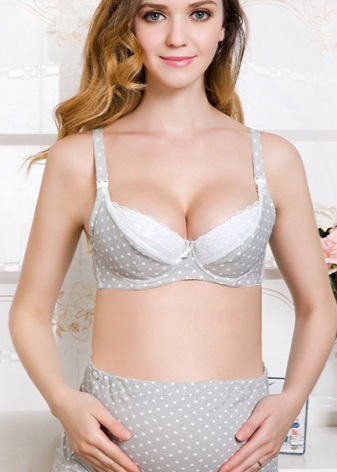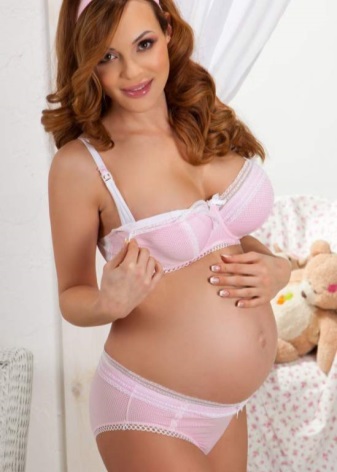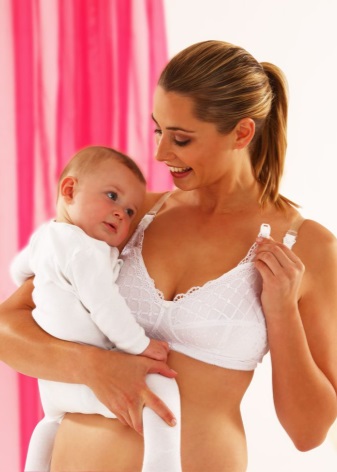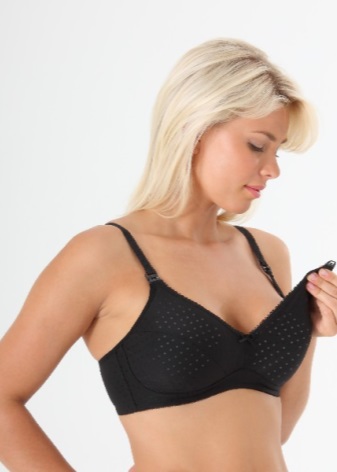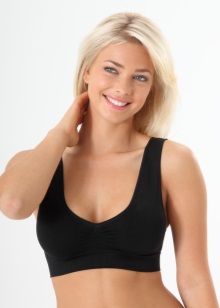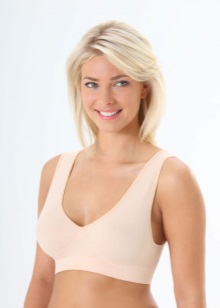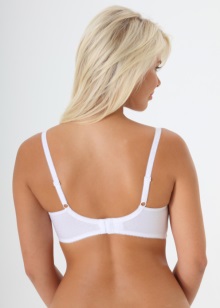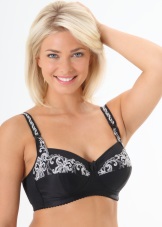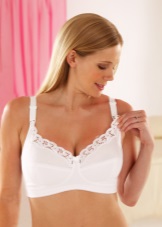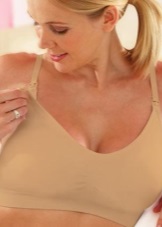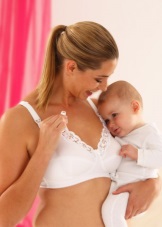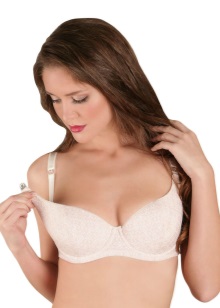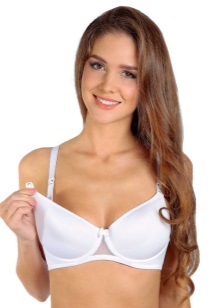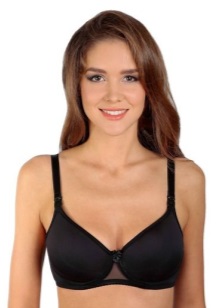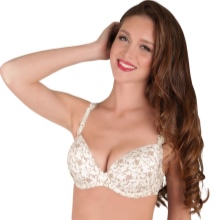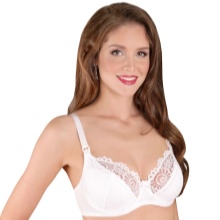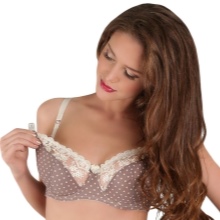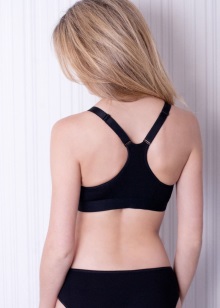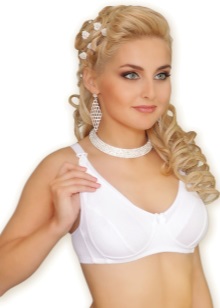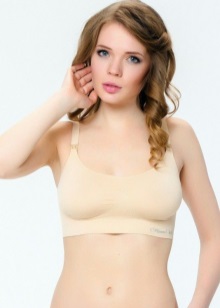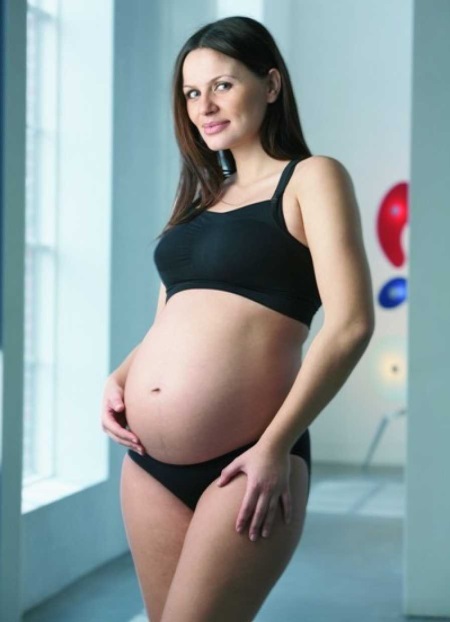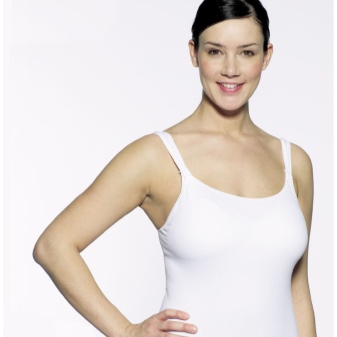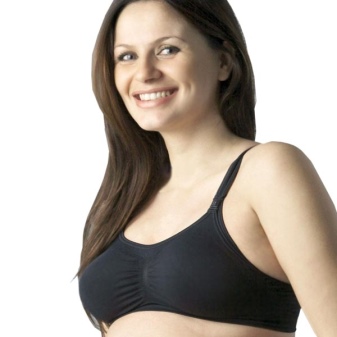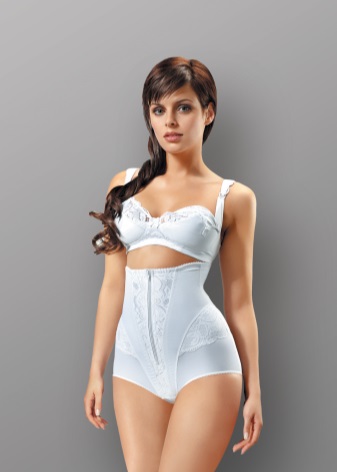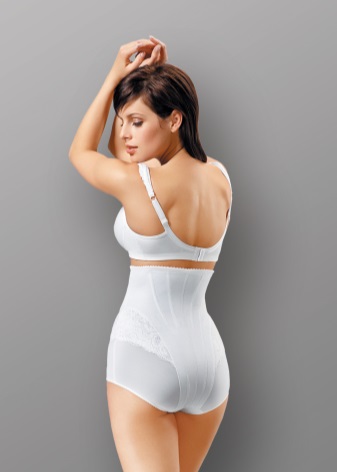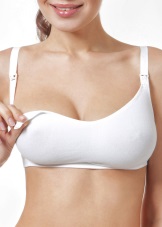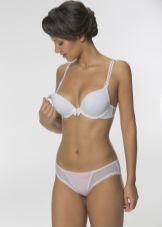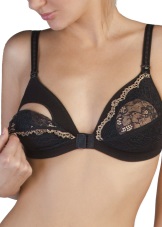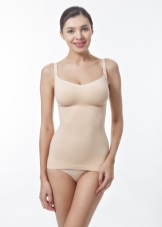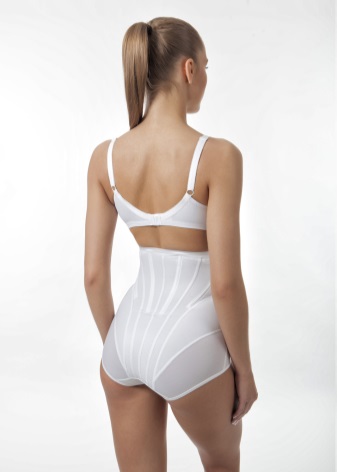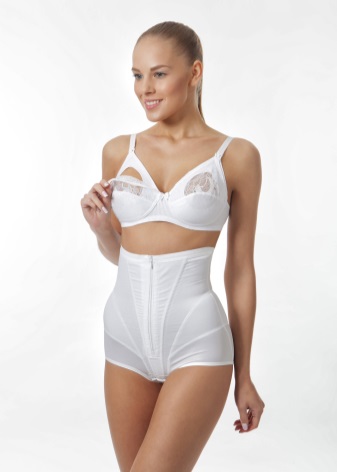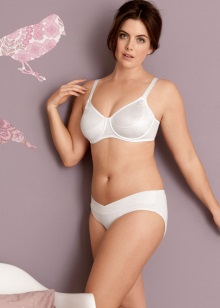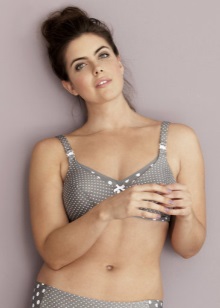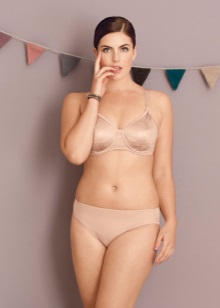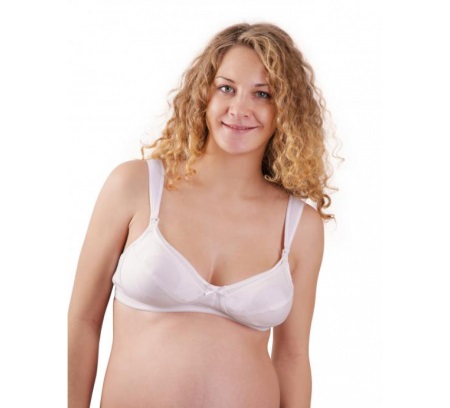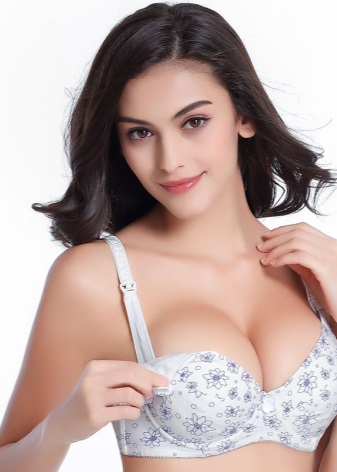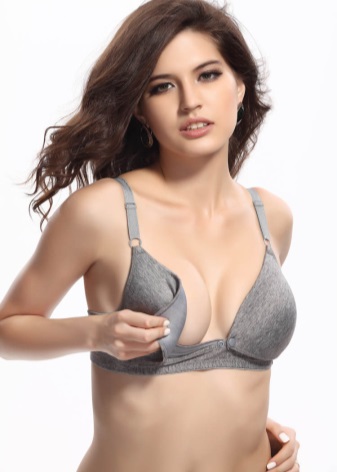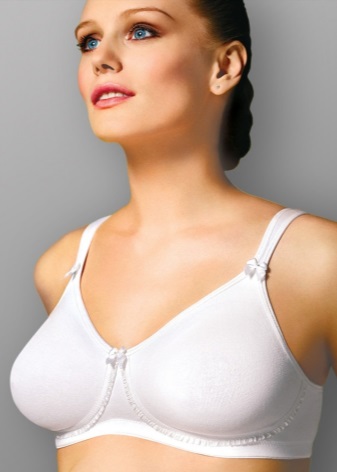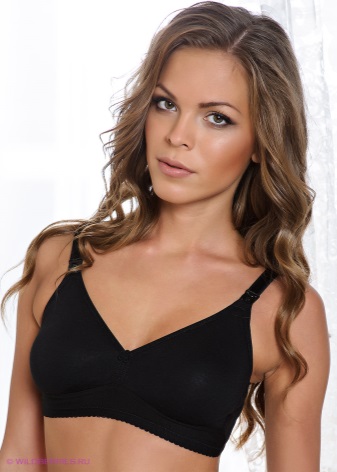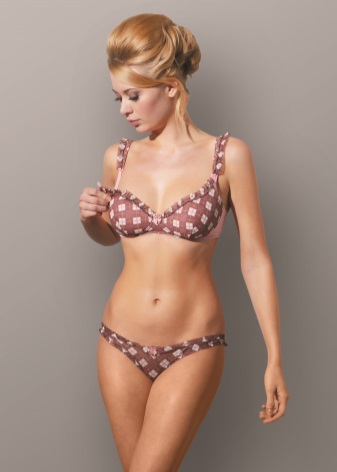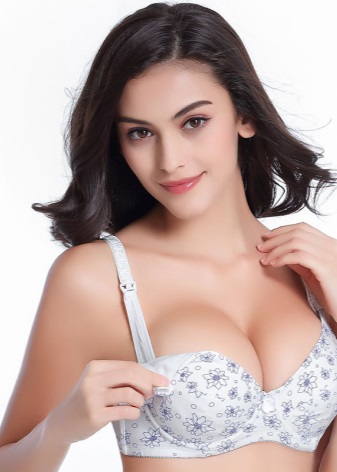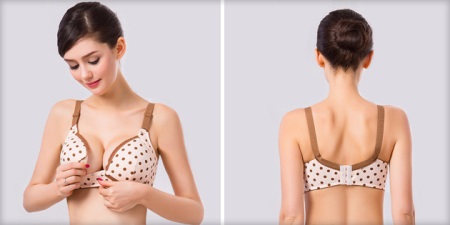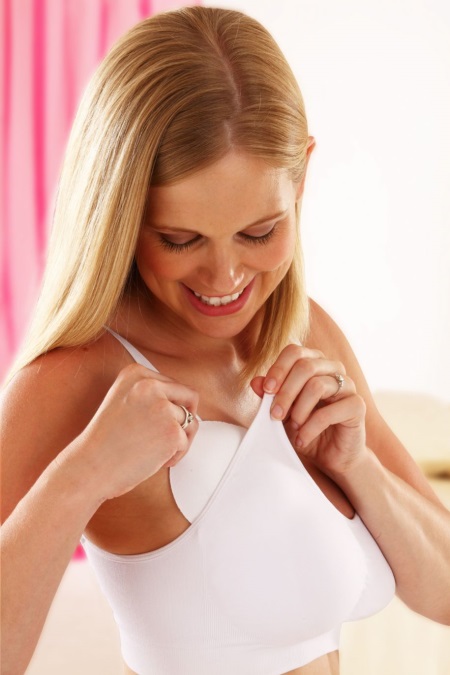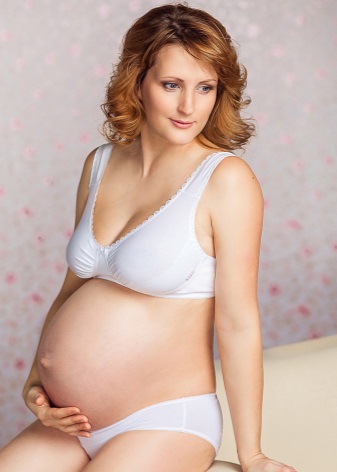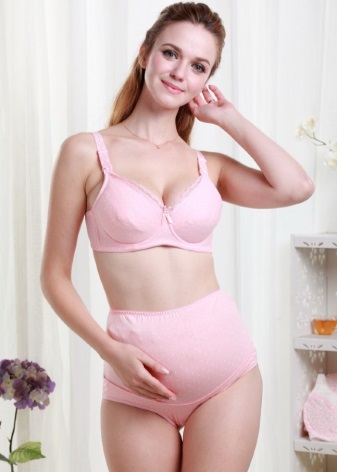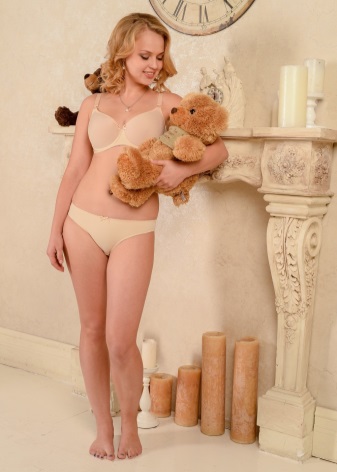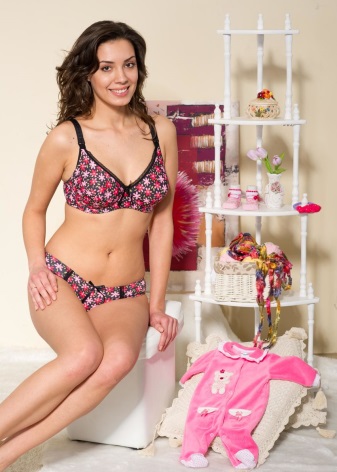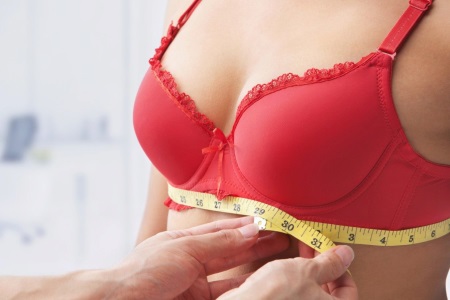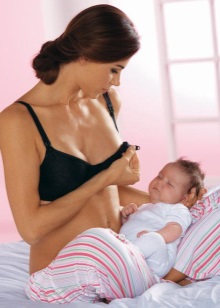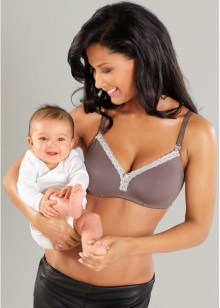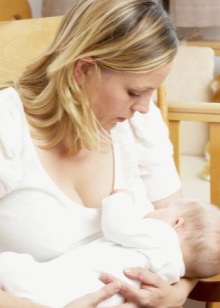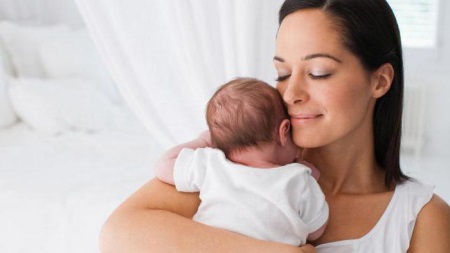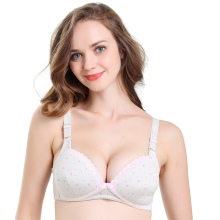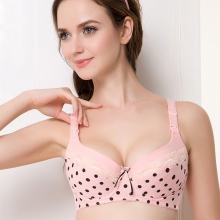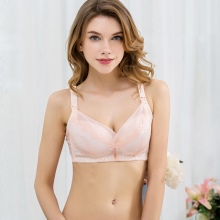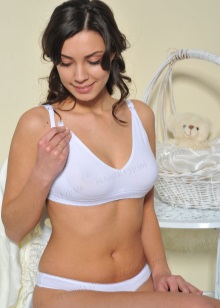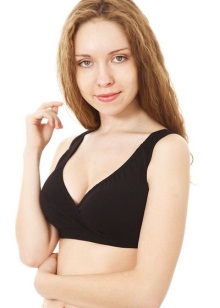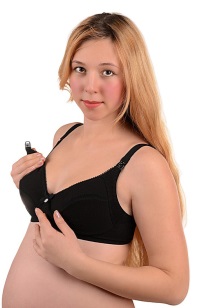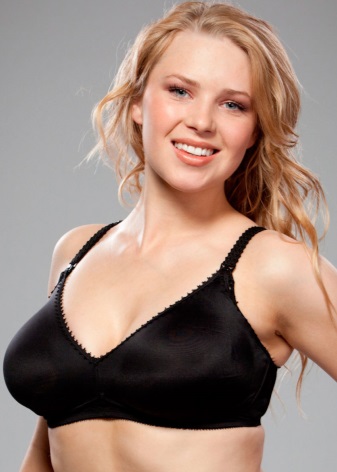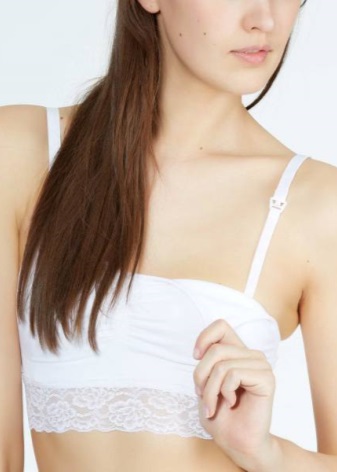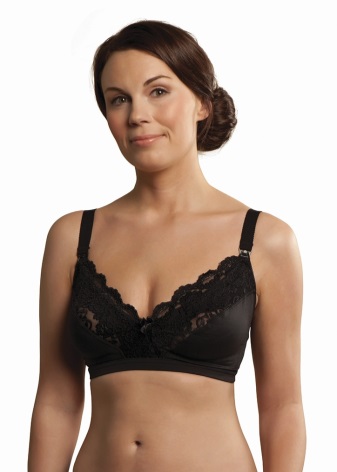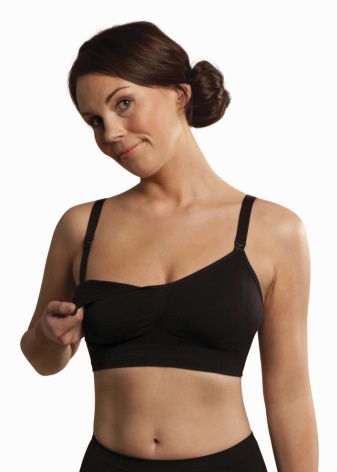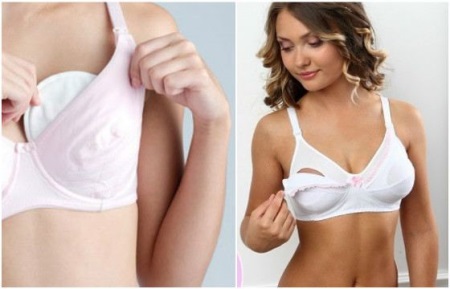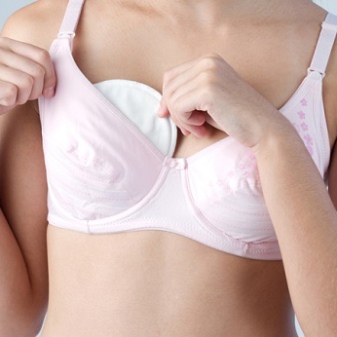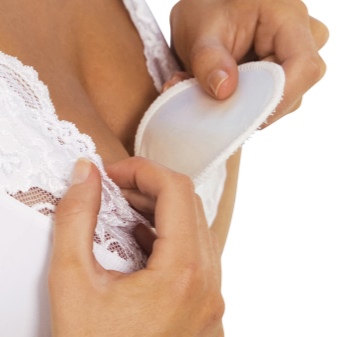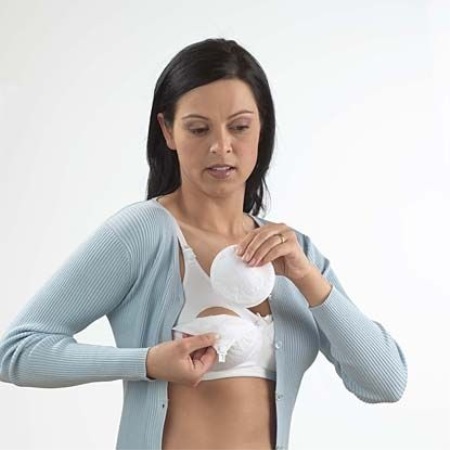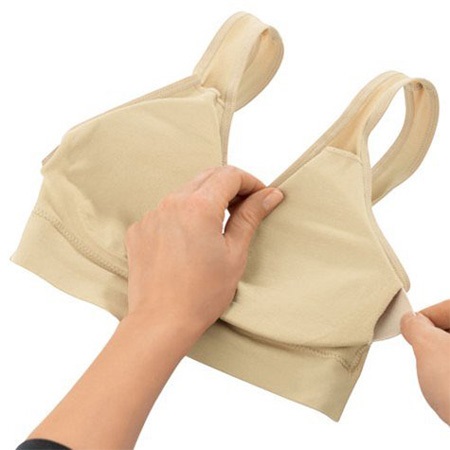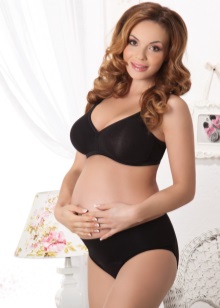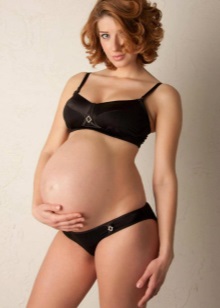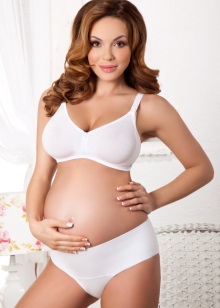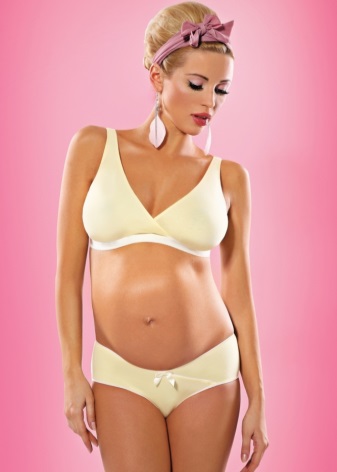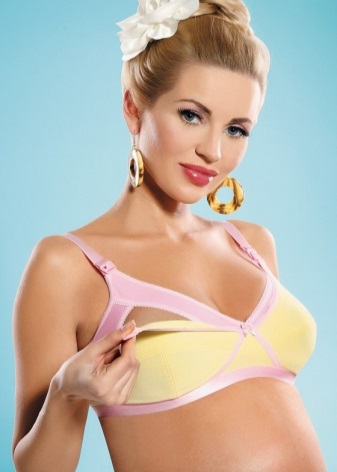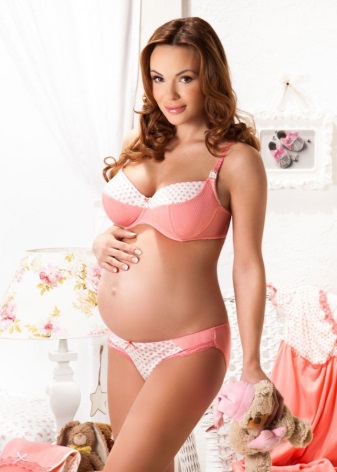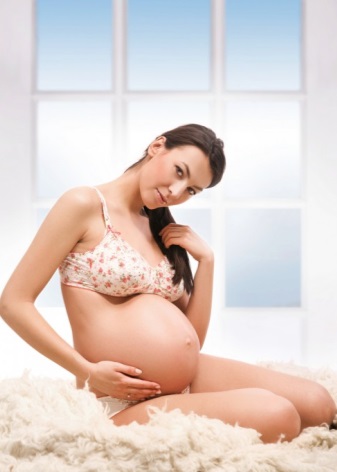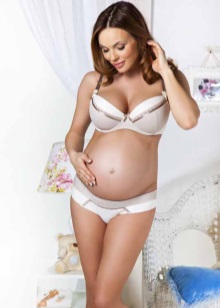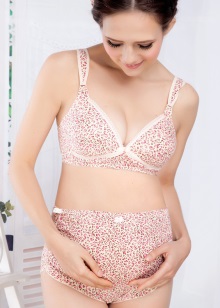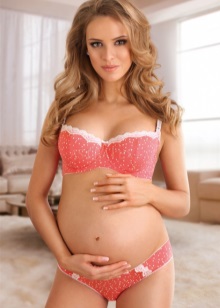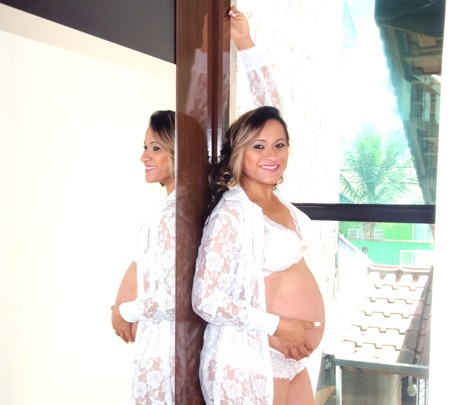In the modern world, the postpartum period is quite easy for women, since many models of lingerie do not just make you feel comfortable, but also perform a protective function. One of these models is a nursing bra, the purpose and features of which we consider in more detail.
Why is it necessary?
In the postpartum period, the body is subjected to the greatest stress, including parts of the body. Most of the load is on the mammary glands, because they are filled with milk and become larger, the skin has to stretch and the breast can lose shape and sag.
Classic bra for feeding under the bones, first of all, is a powerful support for the breast, helping to save it from the loss of experienced forms. A wide line with a clasp allows the young mother to feel as comfortable as possible, does not cut into the skin and perfectly fixes the breast.
With regard to its direct use, a special model bra is needed to facilitate breastfeeding. Due to the fact that the breast can be quite easily and quickly exposed or removed from the bra cup, feeding the child no longer seems so difficult and occurs in more comfortable conditions.
To buy such a product stands directly before childbirth, as the breast swells and increases, and the product purchased in advance can become small and become only a waste of funds.
If you have planned to purchase a nursing bra in advance, you should first consult with your doctor who is leading your pregnancy, clarify how much you can increase the volume and purchase a larger product.
But this applies only to bras with clasps and fixed cups. The models of T-shirts and tops are made of a special elastic material that stretches quite easily, so an increase in breast volume will not be a problem.
How does it look and how does it differ from the usual?
Bra straps for pregnant women are much wider than usual, because the breast in the postpartum period needs much stronger support. And the parts of the cups are unbent and fasten to the buttons or buttons for easy exposure of the necessary part of the breast and easier feeding.
Other models differ from the usual bra in that they are made of elastic fabric in the form of tops or T-shirts that are well suited for home use or for night feeding.
A distinctive feature is the material from which bras are made for pregnant women. It should be a soft fabric, pleasant to the body, having soft hidden seams that do not allow the product to rub the soft skin of a young mother.
Models
Bras for feeding, as well as normal, there are several varieties, because no model range is limited to any one type. Each young mother has her own habits, so she makes her choice based on personal preferences, trying to get the most comfortable product for herself.
Let us take a closer look at each of the types, what advantages they have, and what disadvantages can cause a rejection of the model.
Bra - top
This model of bra is a top like a sports model, made of soft cotton or knitted fabric.May have continuous wide or narrower adjustable straps.
The top model can have a V-shaped cut, then the baby is fed by pushing the fabric on one of the breasts.
Another model of the top is a product from a strip of fabric with a spare front part, which is mounted on special hooks.
This version of the bra has a lot of advantages, including incredible comfort when wearing and using, easy and quick breast removal, pleasant texture of the material.
Among the shortcomings can be noted only the lack of elastic bowls, because of which the breast is in a slightly "hanging" position, which can adversely affect its shape.
Mike - bra
A bra of such a plan has in a cut similar features to the top, and the distinguishing feature is the length, which, as a rule, reaches the waistline or lumbar region.
Such T-shirts are not very practical for use in everyday life, because due to the lack of a supporting line and pits, the breast is in a “hanging” state.
But this model is great for sleeping and greatly simplifies feeding a baby at night.
Seamless
This model is perfect for young mothers with delicate skin that requires reverent treatment and appropriate care. This bra does not rub and does not create discomfort.
The model without seams can be made in the form of a classic bra, and in the form of a top or T-shirt for feeding.
In addition, the classic seamless nursing bra allows you to wear tight evening dresses on top of it.
On the bones
Model underwired - the most aesthetic option, because it supports the shape of the breast, without making it sagging.
The model is equipped with detachable elements that allow exposing part of the breast for feeding. The element is mounted on buttons or invisible buttons.
Some models of underwired bras for feeding have a push-up effect, which makes the breast look more appetizing and seductive.
A distinctive feature of the model with underwire are the foam rubber cups and different options for fasteners - from the back or front.
Brands
Properly selected postpartum underwear plays an important role in the process of feeding the child. Many manufacturers praise their products, focusing on the use of high-quality materials. Consider in practice whether this is true and whether the cost of postpartum nursing bras is justified.
Emma jane
Many models of nursing bras are represented in the collections of this manufacturer. In addition to the rulers, the models are also divided into day and night, each of which has a number of features.
In addition, bras of this brand have a division depending on the shape of the breast, so that in the postpartum period, the young mother feels as comfortable as possible. The bodices are made of natural fabrics, have wide straps and the most comfortable fasteners on the hooks.
The cost of such bras varies in the region of 2,000 - 5,000 rubles, which is quite acceptable and justified.
As for the brand itself, it has been in the market for young mothers for a quarter of a century, delighting customers with convenient and high-quality goods.
Mom Comfort
A line of excellent nursing bras, presented mainly by the underwire models that perfectly support the breasts, helping to maintain its shape after childbirth.
Bras of this manufacturer are not only comfortable, but also very attractive in appearance, they have various decorative elements in the form of printed colors and lace inserts.
Mom's comfort is a domestic manufacturer, the cost of which products are in the region of 1,000 - 2,000, depending on the model.
Medela (Medela)
The Swiss company, which specializes in the manufacture of products and other goods for pregnant and lactating mothers, began its existence in the distant 1961 year.
The brand has established itself as a high-quality manufacturer of luxury goods, and high quality is achieved and maintained through regular innovative research.
The cost of these products is in the range of 2,000 - 5,000 rubles.
Bliss
Another domestic brand specializing in the manufacture of high-quality goods for pregnant women and young mothers, was founded in 1998 in the city of Novosibirsk, and later settled in the capital.
Collections of nursing bras amaze with their breadth, there are models with underwire, tops and T-shirts made from materials of good quality and providing maximum comfort to the young mother.
The cost of such products from 1,500 to 4,000 rubles, depending on the model.
Anita
The brand, representing a huge catalog of goods for pregnant women, includes models of nursing bras.
The pricing policy of this company is quite flexible, you can find a model at a cost of up to 1,000 rubles, and cost about 4,000 rubles.
Our mother
The Ural company, producing goods for pregnant women and nursing, began its existence relatively recently, but quickly gained popularity.
Goods are widely spread due to their gentle pricing policy. The fact is that when using materials of fairly good quality, the cost of bras varies in the range of 500 - 600 rubles.
How to choose?
For some women, the choice of a postpartum bra can be a big problem, because with a negligent attitude, you risk getting uncomfortable underwear that will crush and hamper movement. Let's take a closer look at how to choose a good nursing bra, what to look for and what nuances are especially worth considering.
Material
During pregnancy, the parameters of the female figure change, so you should not base your choice on the usual bra size, it is necessary to measure these parameters and choose them.
The second, but no less important criterion, is the quality of the material. The fact is that in the postpartum period, the skin of the breast is especially sensitive and susceptible, so the fabric from which the product is sewn must be of the highest quality.
Cups
First of all, for the fastest and most convenient commission of the feeding process, it is necessary that the bra cups open and close quickly. It is desirable that a large part of the breast is exposed for closer contact between the mother and the baby during the feeding.
It is best of all that the cuff clasps are not too tight if these are buttons, and they are easily inserted into the loops, in the case of buttons. There are models on lightning, but they are not very comfortable.
In addition, the volume of the cups must be such that specialized inserts can be inserted. Some cups are equipped with special pockets.
Sizing
Determining the correct size is an important point in the choice of bras, but not every girl knows how to do it correctly, so that all the parameters and features of the figure are taken into account.
The first thing you need to measure the circumference of the chest, focusing on the most convex parts. The centimeter at the same time should be in a level position and should not be twisted, as this may distort the result.
Next, you need to measure the circumference of the torso in the area under the breast, taking into account also the even position of the tape.
Size chart
To choose a bra as accurately as possible, it is not enough just to measure the parameters of the figure, you also need to compare them with the dimensional grid, to calculate the appropriate size. All dimensions corresponding to certain parameters are indicated in this table:
|
Under Girth (cm) |
62 to 66 |
From 67 to 71 |
72 to 76 |
From 77 to 81 |
82 to 86 |
From 87 to 91 |
92 to 96 |
From 97 to 101 |
102 to 106 |
107 to 111 |
112 to 116 |
117 to 122 |
Cup size |
|
Chest girth (cm) |
76 to 78 |
81 to 83 |
85 to 88 |
From 91 to 95 |
96 to 98 |
From 101 to 105 |
From 106 to 110 |
111 to 115 |
From 116 to 120 |
A |
|||
|
From 79 to 81 |
84 to 86 |
From 89 to 91 |
94 to 96 |
98 to 102 |
103 to 107 |
108 to 112 |
113 to 117 |
From 118 to 122 |
123 to 127 |
128 to 132 |
133 to 138 |
B |
|
|
81 to 83 |
86 to 88 |
From 91 to 93 |
96 to 98 |
From 101 to 103 |
106 to 108 |
111 to 113 |
From 116 to 118 |
121 to 123 |
126 to 128 |
From 131 to 133 |
136 to 138 |
C |
|
|
From 83 to 85 |
From 88 to 90 |
93 to 95 |
98 to 100 |
103 to 105 |
108 to 110 |
113 to 115 |
From 118 to 120 |
123 to 125 |
128 to 130 |
133 to 135 |
From 138 to 140 |
D |
|
|
From 90 to 92 |
95 to 97 |
100 to 102 |
105 to 107 |
110 to 112 |
From 115 to 117 |
120 to 122 |
125 to 127 |
130 to 132 |
135 to 137 |
140 to 142 |
DD, E |
||
|
From 91 to 93 |
96 to 99 |
From 101 to 104 |
108 to 109 |
111 to 114 |
115 to 119 |
From 121 to 124 |
126 to 129 |
From 131 to 134 |
136 to 139 |
140 to 144 |
F |
||
|
93 to 96 |
98 to 101 |
103 to 106 |
109 to 112 |
113 to 116 |
From 118 to 121 |
122 to 126 |
From 129 to 131 |
134 to 136 |
139 to 141 |
144 to 146 |
G |
||
|
The size of the bra itself |
65 |
70 |
75 |
80 |
85 |
90 |
95 |
100 |
105 |
110 |
115 |
120 |
|
|
Women's clothing size |
From 34 to 36 |
From 36 to 38 |
From 38 to 40 |
40 to 42 |
42 to 44 |
From 44 to 46 |
From 46 to 48 |
48 to 50 |
50 to 52 |
From 52 to 54 |
From 54 to 56 |
56 to 58 |
This table provides the most detailed and accurate data with which you can easily determine which bra is right for you.
But, as already mentioned, the choice of a nursing bra should be made in the postpartum period or in the last months of pregnancy, because the parameters of the figure change with the changes in the hormonal levels and the appearance of milk, so the pre-selected product may simply not be suitable.
What material is it made of?
Feeding bras differ not only in models and sizes, the differences relate to what material the product is made of. Each of the fabrics has characteristics peculiar only to it and functional features.
- Cotton. Some models, usually the highest quality luxury class, are made from high-quality cotton material, which is perfectly breathable, while allowing the skin to breathe. But such a product may not be very practical, because it has low wear resistance and quickly loses its original appearance, and at the same time, many functional features.
- Knitwear To create more durable and functional models, high-quality knitwear with cotton fiber content is used, which provide the material with breathable properties. Knitwear is more elastic, so it exactly repeats the outlines of forms and perfectly “sits” on the chest.
- Microfiber. Among the obvious advantages of this material can be noted quite low cost, which makes feeding bras more affordable for any budget. Also, the material perfectly stretches, and the bra supports the chest well.
But against the background of one big disadvantage, all these advantages fade and become insignificant, because microfiber is not a natural material, therefore it does not allow the skin to breathe and can cause discomfort, and sometimes even an allergic reaction in too susceptible tender skin.
- Polyamide. This material is quite common, but undesirable for the postpartum period, because it has a synthetic origin. But recently, in the manufacture of polyamide began to use hypoallergenic fibers, which makes it quite suitable for sewing bras for nursing.
In addition, postpartum underwear made of polyamide is good because the models have high wear resistance, elasticity and wear resistance.
What are liners for?
Many postpartum bras are equipped with additional elements, such as liners, which are sometimes referred to as pads. Let us consider in more detail what it is, what functions the liners perform and why they are needed.
Inserts are a kind of thin reusable foam pads that have a high degree of absorption. Inserts are inserted into the bra, tightly clinging to the chest, and sometimes the product is equipped with a specially designated pocket.
Some consider liners to be a waste of finance, but in fact, based on hygiene issues, postnatal liners are more of a necessity, since they solve the problem of “runaway” milk.
The fact is that it is often the case that milk is leaking from the breast and when wearing a regular bra on clothes there are wet spots, which is not only not hygienic, but it looks somewhat aesthetic.
In order to prevent the appearance of such “wet” traces, it is such liners that perfectly absorb all breast discharges. In case of strong blotting, they can be easily replaced with new ones.
Since this item is reusable, there is no need to purchase a large number of liners, it is quite possible to do with three - four pairs.
Reviews
When analyzing the numerous reviews of young mothers, the uniqueness of the postpartum bra becomes obvious, because almost no girl can do without such a product during this period.
Only about 1.5% of all women consider a nursing bra to be a waste of money and adhere to the old feeding methods, while wearing a completely ordinary, everyday bra.
About 17.5% prefer bras made of pure cotton, but in this case it is necessary to purchase products with a fairly frequent frequency, since, as already mentioned, cotton wears out pretty quickly.
About 20% prefer microfiber products, not paying attention to the fact that the material is synthetic and can cause a reaction. Quite a few women are attracted by the low price and high degree of strength and durability.
But the bulk - 51%, prefer postpartum bras from hypoallergenic, durable polyamide. Such products will last a long time, being in good shape, so with careful use, replacement may not be necessary.
In addition, when analyzing the reviews it becomes clear that the vast majority of women consider it necessary to use bra inserts.
Also, many young mothers prefer night models and bras without stones as a home option.
